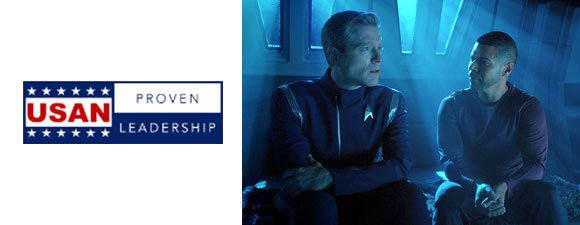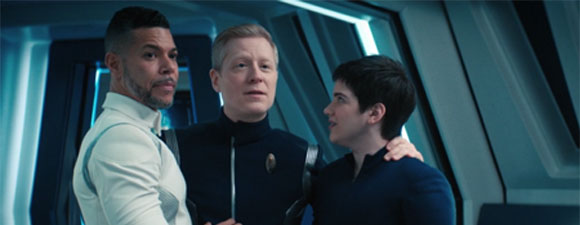Berman: Too Much Trek
3 min readIf Rick Berman had had his way, new Star Trek television series would have been spaced out a little better and not put right on top of each other, and Berman would not have done the Star Trek: Enterprise finale that angered many viewers.
Once Star Trek: The Next Generation ended, the network wanted more Trek, even though Star Trek: Deep Space Nine was still on air. “We asked them to wait a couple of years,” said Berman. “They said, ‘We have all these time slots available. We don’t want to lose them.’ They felt very strongly about a new series.”
 But Berman was aware that the franchise needed a new and fresh idea, not just a remake of The Next Generation. “We didn’t just want to have another ship, give it the name Voyager as opposed to Enterprise, and fill it with a nice balance of humans and aliens,” he said. “This was a show that I asked Jeri Taylor to join Michael and me in creating. The whole idea of being thrust to a far-off part of the galaxy and being out of touch with Starfleet, out of touch with instructions and rules, in a sense, and having to join together with Maquis that we run into in the pilot episodes, the whole of idea of getting back at any cost – question mark; it shouldn’t be at any cost – I think, allowed us to do some new stuff, which was important. We were all aware that these things could get stale. A lot of the writers were the same writers and a lot of the writers were new writers, but we didn’t want to do TNG again.”
But Berman was aware that the franchise needed a new and fresh idea, not just a remake of The Next Generation. “We didn’t just want to have another ship, give it the name Voyager as opposed to Enterprise, and fill it with a nice balance of humans and aliens,” he said. “This was a show that I asked Jeri Taylor to join Michael and me in creating. The whole idea of being thrust to a far-off part of the galaxy and being out of touch with Starfleet, out of touch with instructions and rules, in a sense, and having to join together with Maquis that we run into in the pilot episodes, the whole of idea of getting back at any cost – question mark; it shouldn’t be at any cost – I think, allowed us to do some new stuff, which was important. We were all aware that these things could get stale. A lot of the writers were the same writers and a lot of the writers were new writers, but we didn’t want to do TNG again.”
When asked, Berman wasn’t keen on doing Star Trek: Enterprise at first. “I was reluctant,” he said. “I was quoted many times as saying that you could take too many trips to the well, that you could squeeze too many eggs out of the golden goose, but the powers that be – the powers that were – made it very clear to me that if I did not do this they would ask someone else to.”
Star Trek: Enterprise wasn’t as popular as previous series and Berman felt that part of the reason was that people were a bit tired of Star Trek. “I always felt that whoever came up with the term ‘franchise fatigue’ was right, that there was definitely some of that,” he said. “There was just too much going on at the same time. By then, DS9 had ended, Voyager was still on the air, a third TNG movie was coming out, and there was definitely a feeling that maybe we were pushing it. ‘Oh, my God, here comes another Star Trek show.’ It was the fourth Star Trek series in a decade.”
Berman may have been right about the franchise fatigue, but he and Brannon Braga miscalculated when it came to the Star Trek: Enterprise finale, which drew a negative fan response. “I would have never done it if I had known how people were going to react,” he said. “We were informed with not a whole lot of time that this was our last season. We knew that this was going to be the last episode of Star Trek for perhaps quite some time – and here we are, almost six years later. So it was the last episode for quite a length of time. It was a very difficult choice, how to end it. The studio wanted it to be a one-hour episode. We wanted it to be special. We wanted it to be something that would be memorable.
“This idea, which Brannon and I came up with – and I take full responsibility – pissed a lot of people off, and we certainly didn’t mean it to.
“It seemed like a great idea. A lot of people were furious about it. The actors, most of them, were very unhappy. In retrospect it was a bad idea. When it was conceived it was with our heart completely in the right place. We wanted to pay the greatest homage and honor to the characters of Enterprise that we possibly could, but because Jonathan (Frakes) and Marina (Sirtis) were the two people we brought in, and they were the ones looking back, it was perceived as ‘You’re ending our series with a TNG episode.'”






